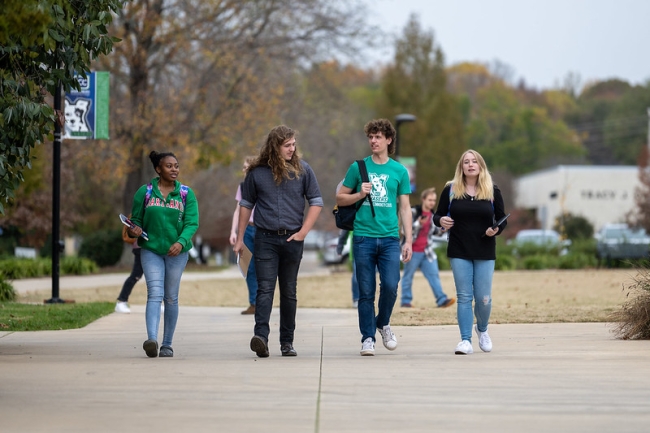You have /5 articles left.
Sign up for a free account or log in.

Faculty members and administrators are at odds over shared governance concerns at Spartanburg Community College.
Spartanburg Community College
A group of professors at Spartanburg Community College is fighting back after administrators replaced their almost a decade-old Faculty Senate with a new representative body. The move came after the senate planned to vote on whether to oppose a policy regarding work-from-home hours for certain professors.
Outside organizations—including the American Association of University Professors (AAUP) and the South Carolina Inspector General’s Office—are now investigating the college in response to faculty members complaints about their concerns.
Bruce Dillenbeck, former president of the Faculty Senate and current president of the college’s recently formed AAUP chapter, has worked at the South Carolina college for 33 years and said “the attitude of fear among faculty” has never been higher.
“ … They can’t treat faculty this poorly and not expect a challenge,” said Dillenbeck, who is also academic director of history. “So, we're trying to challenge this as far as we can.”
College administrators told The Post and Courier, which initially reported the story, that these divisions are a distraction from Spartanburg’s success and growth.
Michael Mikota, president of the college since 2020, said in a statement to the local news outlet that campus leaders would “continue to focus our attention on our students and serving our communities while minimizing distractions and divisive attempts to derail our momentum …”
The conflict comes at a time when Spartanburg has experienced explosive enrollment growth. The student roll increased by 52 percent, from 4,108 students in 2020 to 6,224 in 2022, largely because of the launch of a free-tuition program.
A Fractured Relationship
The tensions between administrators and faculty members were already building but came to a head when some administrators started requiring professors to spend their work hours, 37.5 hours per week, on campus.
The dean of the technologies division conveyed this expectation to department chairs via email in March, spurring a surge of complaints from professors to the Faculty Senate, Dillenbeck said. He added that science faculty members have also complained about the directive.
Colton Grace, a Spartanburg spokesperson, said in an email to Inside Higher Ed that the in-person work requirement fell under pre-existing policy. He said the requirement also met the academic needs of students in “hands-on” technical fields, such as welding and automotive technologies, who benefit from having faculty members on campus full-time “to advise and support students.”
Dillenbeck said a policy has been in place since 2014 giving faculty members flexibility on when they work on- or off-campus.
Several professors, who spoke with Inside Higher Ed anonymously because of fear of retaliation, said flexible schedules have long been a perk of the job. Grading and preparing for classes at home enables parenting professors to pick up their children from school or to work later hours.
Dillenbeck sent a mass email to colleagues, citing concerns that the notice of the requirement came without faculty input and calling for a vote on whether to formally protest the policy. The email noted that if professors voted in favor of objecting to the requirement, administrators would be notified, placing “SCC’s faculty in an adversarial position to its administration,” a decision “not to be taken lightly.” But the email was blocked. Administrators acknowledged that they prevented the email from going through.
Grace asserted that it’s “common practice for large institutions to monitor usage of mass email distribution lists.”
“Dr. Dillenbeck’s email threatening to place the faculty of SCC ‘in an adversarial position’ to the administration was flagged due to its potential to further create a hostile work environment and give rise to the potential of the College being unable to fulfill its mission,” Grace wrote. “The College does not monitor the email usage of its employees outside of the mass email distribution lists.”
Dillenbeck nonetheless scheduled a Faculty Senate meeting to hold the vote in April. The day of the meeting, administrators met with him ahead of time and urged him to cancel it, but he said he refused. Shortly after his meeting with administrators, an email from chief academic officer Lisa Satterfield went out to all faculty members, informing them that, because some professors were uncomfortable with the direction of the Faculty Senate, an Academic Council would be formed “in lieu of a Faculty Senate” and that it would be “effective immediately.”
“Some of you have clearly communicated that you have no desire to be in an adversarial position to the administration and that the Faculty Senate is not a true representation of the thoughts, feelings, and ideas of the faculty as a whole,” Satterfield wrote. “Several of you have further indicated that this has put you in a very uncomfortable position.”
Grace said Satterfield made this call out of concern for students after administrators heard rumors in April that professors were considering protest options, such as a faculty walk-out, a boycott of graduation or withholding student grades. (Dillenbeck and several other faculty members denied this claim.) Grace contends “there was no action taken by the administration of SCC to disband the Faculty Senate,” but rather they decided to “redesign the existing Curriculum Review Committee into the Academic Council and recognize it as the main voice of faculty representation and academic governance,” a decision the president’s cabinet approved on April 18.
“At Spartanburg Community College, our policies and procedures recognize that primary responsibility for the content, quality and effectiveness of curricula is placed on the faculty,” Grace said. “For matters outside of these factors there is no policy or procedure at Spartanburg Community College requiring policy or procedure revisions, deletions, or additions to be approved by faculty and/or staff.”
The faculty vote did not happen; instead they used the meeting to strategize about how to respond to the disbanding of the Faculty Senate.
Some faculty members said the email from Satterfield left them feeling like they no longer have an avenue to raise concerns.
“Instantly the atmosphere on campus changed,” said one faculty member, who has taught at the college for a decade. “If I had a concern, I could go to any of the senators … Now you realize I don’t have a voice and the person above me, Dr. Satterfield, doesn’t care that I don’t have a voice. That’s a really bad work environment to be placed in, and it happened in an instant.”
They noted that some professors are reluctant to bring up faculty-related issues to the new Academic Council because they’re concerned the topics will be tabled by administrators at best and lead to backlash at worst.
Professors “just want to be heard,” said another longtime faculty member. “They just want what is fair and due to them, and we have nobody to listen to us now. Our Academic Council is a true joke.”
Dillenbeck was left even more ill-at-ease after he was copied on an email from a campus police lieutenant to the chief academic officer in May saying he had been tasked with “looking into Mr. Dillenbeck” on her behalf.
“If you could please provide me with a schedule for him this will aid me in the review of the security cameras,” reads the email, shared with Inside Higher Ed. When Dillenbeck responded with confusion, the lieutenant told him they were referencing a student with a similar name and he had been accidentally copied, but Dillenbeck doesn’t buy it.
Grace said campus police have confirmed they “do not have either an open or closed investigation concerning Dr. Dillenbeck.”
External Investigations
A group of professors responded to the disbanding of the Faculty Senate by forming an AAUP chapter. Dillenbeck also filed a complaint in June on behalf of the chapter with the college’s accreditor, the Southern Association of Colleges and Schools Commission on Colleges. The complaint states that the replacement of the Faculty Senate with a new body departed from existing policy and broke the senate’s bylaws. The accreditor responded via email in July that the complaint had been reviewed and the accreditor would seek “additional information” from the college about the situation. Dillenbeck also filed a complaint in July with the South Carolina Office of the Inspector General, which he said is currently investigating the matter. (Brian Lamkin, South Carolina’s inspector general, wrote in an email to Inside Higher Ed that his office would “not provide public comment on pending matters.”)
The AAUP is also investigating Spartanburg administrators’ actions and preparing to issue a report. Investigators met with at least 20 faculty members in July, though administrators reportedly refused to participate, said Mark Criley, senior program officer for the Department of Academic Freedom, Tenure, and Governance at the AAUP.
Grace, the college’s spokesperson, said the AAUP has no right to “coerce the College to adhere to any of its tenets, guidelines, or practices.”
Depending on the findings of the AAUP investigation, the college could wind up on the AAUP’s sanctioned institutions list, which identifies colleges and universities that fail to comply with its academic freedom and shared governance standards.
A sanction “communicates to the profession and to the public that this is an institution where there are serious problems with the mechanisms of shared governance and joint action,” Criley said. Campus leaders deciding the fate of a faculty representation group is “an issue of grave concern to us, because it’s essential that there be a voice by which the faculty can convey its views.”
Such an “extreme maneuver” is a fairly uncommon move by campus leaders. Criley listed a handful of examples of institutions that disbanded faculty senates in the last 25 years, including Miami Dade College in the early 2000s, Rensselaer Polytechnic Institute in 2007, Idaho State University in 2011 and Union County College in 2015.
Michael Harris, a professor of higher education and chair of the education policy and leadership department at Southern Methodist University, also described replacing a faculty senate as a rare “nuclear option” that generally comes after “a really serious breakdown” in the relationship between professors and administrators.
However, what stood out to him was the blocking of Dillenbeck’s email to faculty members. He said he can’t recall a case in which administrators monitored and blocked an email having to do with normal Faculty Senate procedures.
“Clearly the university owns the email servers and manages those resources” but blocking an email organizing a Faculty Senate vote is outside of the realm of normal administrative behavior, he said. “The surveillance aspect of this, that seems highly unusual to me” and “very Big Brother.”
He said he wouldn’t be surprised if the college’s boom in enrollment was exacerbating tensions.
“Budget cuts or huge swings in enrollment positive or negative, layoffs, any of those kinds of major stressors on the institution will stress the governance system,” he said.
Grace said that “some growing pains are to be expected” and “assuredly there are individuals here who are hesitant of change and our effort to ensure all facets of our operations are geared towards customer service and student success” but “an overwhelming majority of our faculty and staff are excited to be at an institution that is bucking nationwide enrollment trends.”
Dillenbeck believes the enrollment growth has given the administration positive publicity that’s overshadowed its bad treatment of faculty members.
“If our college can’t acknowledge the centrality of faculty and what goes on in the classroom, that raises all kinds of issues, and this administration is very, very dismissive of the professors, of faculty in general,” he said.





